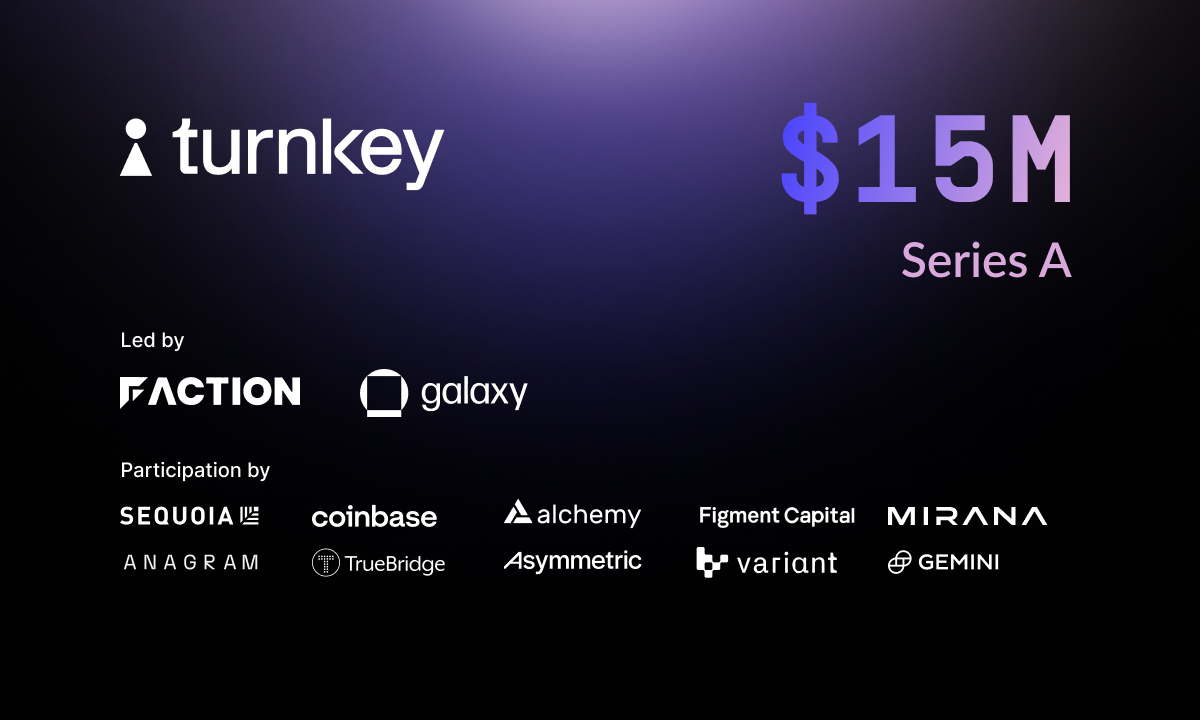
[PRESS RELEASE – New York, NY, April 23rd, 2024]
Turnkey, the leading provider of secure, flexible, and scalable wallet infrastructure for crypto developers, announced today that it has raised a $15 million Series A funding round. The round was led by Lightspeed Faction and Galaxy Ventures, with participation from Sequoia, Coinbase Ventures, Alchemy, Figment Capital, and Mirana Ventures.
Before a user can do anything onchain, they must jump through a series of hoops: download a browser extension, write down their seed phrase, and figure out how to approve a transaction for the first time. With all these onboarding hurdles, it’s nearly impossible to retain users if something goes wrong. Solving this is one of crypto’s most important priorities.
Turnkey is solving the crypto UX problem from the ground up. The company’s product suite enables developers to build anything that involves a wallet or cryptographic transaction, and already powers some of the best developer tools and applications in the industry, including Alchemy, Dynamic, Goldfinch, Halliday, Thunder Terminal, and Kinto. These companies have integrated Turnkey to provide embedded and smart wallet services, biometric passkey logins, and seamless onboarding experiences for their users, with Turnkey powering up to 100,000s of transactions per day.
“Developers rely on Alchemy every day to build innovative applications in crypto. At our scale, security and reliability are paramount. We chose Turnkey because they’re one of the most secure wallet infrastructure solutions on the market. Their novel approach to security ensures end users remain in control of their private keys, while allowing us to create dramatically better UX,” said Will Hennessy, Product Lead at Alchemy.
Turnkey was co-founded by Bryce Ferguson and Jack Kearney, who previously built Coinbase Custody from 0 to $100B+ in assets, and subsequently went on to lead the crypto team at Trade Republic and engineering at Polychain. The company’s world-class team also includes exceptional talent from top crypto companies like Coinbase, BitGo, and Parity.
“Crypto is still too hard to use for the average person,” said Ferguson, Turnkey’s co-founder and CEO. “But instead of approaching this problem from first principles, the industry has tried to remedy it by creating shinier wallets and slicker UI components. None of this will onboard the next billion users when crypto’s fundamental UX issues stem from the inherent challenges of self-custody.”
“Developers burning time bootstrapping their infrastructure has become a major hurdle for the industry. When building products, developers shouldn’t have to sacrifice security and scalability for convenience. Turnkey is building the wallet infrastructure necessary to bring more users and institutions onchain,” added Samuel Harrison, Managing Partner at Lightspeed Faction.
Turnkey believes that a true upgrade for web3 users doesn’t just entail making wallets more beautiful or simpler to use; it requires challenging pre-existing notions of how we interact with the blockchain entirely. The company is committed to building a decentralized future and is excited to empower developers to create the onchain products of tomorrow.
“Our focus on bespoke tooling and verifiable security is what enables companies to build web2-like experiences for their crypto products,” said Kearney. “We’re excited to use this funding to accelerate innovation in the crypto space and onboard the next wave of crypto power users.”
###
About Turnkey
Turnkey is secure, flexible, and scalable wallet infrastructure offering low-level primitives for teams building unique on-chain experiences. Founded by the team that built Coinbase Custody, Turnkey is powering serious applications across a wide range of use cases, from wallets-as-a-service to programmatic backend crypto automation. By leveraging a novel security framework, Turnkey achieves 50-100ms signing latency for millions of wallets, all with affordable transaction-based pricing that’s designed for scale. For more information, please visit https://www.turnkey.com.
This article first appeared at CryptoPotato
